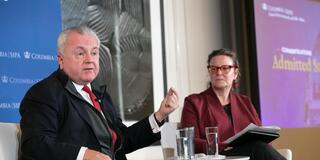Ambassador John J. Sullivan Discusses Russia and Ambassadorial Work with Admitted Students

Some 200 newly admitted SIPA students — all potential members of the Class of 2026 — were treated to a lively fireside chat featuring the former US Ambassador to the Russian Federation, John J. Sullivan. The discussion, moderated by Page Fortna, a Columbia professor and director of SIPA’s Arnold A. Saltzman Institute of War and Peace Studies, touched on a variety of topics — from Russia’s sham presidential election in March to intelligence sharing between Moscow and Washington, to whether or not the United States should support fledgling democracies across the world during a busy year of global elections.
The ambassador, who is a Carnegie Distinguished Fellow at SIPA’s Institute of Global Politics, was stationed in Moscow in early 2022 when US intelligence picked up strong signals of a pending invasion of Ukraine by Russia. He noted that the Russians had significantly overestimated the ease with which it would sack the current government of Ukraine and seize Kyiv: Their soldiers, for example, packed uniforms and supplies to last them only two weeks.
“Putin will not surrender his goals in Ukraine,” Sullivan told the admitted students, adding that the human suffering of this conflict outmatches any war on the continent since World War II. “It’s on a staggering scale, the war that Russia unleashed in Ukraine.” He said that whether the current stalemate turns into a Russian or Ukrainian victory or “frozen conflict” will depend on what happens in Washington, not in the Donbas region of eastern Ukraine.
The event was part of a full day of programming that had begun with a wide-ranging conversation between Dean Keren Yarhi-Milo and Secretary Hillary Rodham Clinton, who dispensed advice to the admitted students about their future careers. Clinton talked about the importance of diplomacy to resolve crises, recognizing their biases when making decisions, and listening to others with whom they may disagree. Admitted students were also treated to an expo of SIPA’s various student groups.
Sullivan, who served in multiple diplomatic positions across five presidential administrations, discussed how the current administration had shifted its focus and devoted resources toward China as part of a larger US pivot toward East Asia, and suggesting also that it may have taken its eye off the ball in terms of deterring Russia or preventing conflicts in the Middle East. As a case in point, he cited a June 2021 summit between Presidents Biden and Putin that focused almost entirely on the US withdrawal from Afghanistan, climate change, and wrongfully detained Americans in Russia. The topic of Ukraine never came up.
“Putin will not surrender his goals in Ukraine."
— Ambassador John J. Sullivan
Sullivan likened Putin’s ambitions to redraw Europe’s borders to Nazi Germany’s justifications for invading Poland. Just as Hitler expressed a sense of betrayal over Germany’s loss in first World War, Putin (who as a junior KGB officer was stationed in Dresden) has called the collapse of the Soviet Union at the end of the Cold War a “tragedy.”
The job of overseeing an embassy in Russia is made more difficult by the fact that 7,000 Russian intelligence officers are assigned to monitor its employees. He said that “morale [took] a big hit,” but that his staff concocted ways to circumvent the spying by their host government and even poke fun at it – a plan he called “Operation Twisted Sister,” named for the 1980s metal band whose anthem “We’re Not Going to Take It” summarized embassy morale.
Sullivan also addressed other conflicts raging in the world; he was asked if he thought Israel would retake Rafah in Gaza with force. The ambassador — prefacing that he was speaking solely as a consumer of news, said “the Israeli government is committed to do this, with as few casualties as possible, and it would be an extraordinary thing” — meaning, very unlikely — “if Israel were to surrender that goal.”
Sullivan also relayed a telling anecdote about his time serving former President Trump. He and a former national security advisor, H.R. McMaster, were briefing Trump in advance of a meeting with Putin shortly after the Russian president was reelected. They scrawled in boldface across their briefing paper, “Do not congratulate the Russian president on the sham election he just won.” Trump ignored their instructions and, immediately upon meeting his Russian counterpart, said, “Vladimir, what a great win!”
The anecdote prompted Fortna’s final question, directed to the audience largely in jest: How does one acknowledge an autocrat’s bogus election victory without appearing to congratulate them?
View the complete discussion: